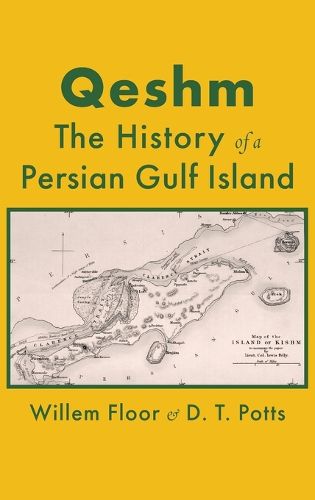Readings Newsletter
Become a Readings Member to make your shopping experience even easier.
Sign in or sign up for free!
You’re not far away from qualifying for FREE standard shipping within Australia
You’ve qualified for FREE standard shipping within Australia
The cart is loading…






This title is printed to order. This book may have been self-published. If so, we cannot guarantee the quality of the content. In the main most books will have gone through the editing process however some may not. We therefore suggest that you be aware of this before ordering this book. If in doubt check either the author or publisher’s details as we are unable to accept any returns unless they are faulty. Please contact us if you have any questions.
Located in the Straits of Hormuz, the island of Qeshm has had a tumultuous history. Qeshm: The History of a Persian Gulf Island is the first serious, book-length study of the island's history.
From the fourteenth century onward, the island was an important dependency of the Kingdom of Hormuz, often providing drinking water to Hormuz. The island remained critical as a source of water and foodstuffs for the Portuguese, beginning in the early-sixteenth century. Throughout the seventeenth century, Qeshm remained a bone of contention between Portugal, the Dutch and the English East India Companies. Later, it was a coveted tile in the mosaic of Persian Gulf domination aspired to by the Soltans of Oman, despite the pretensions of the Qajar court. The natural resources of Qeshm include salt, the purest in the Persian Gulf, naphtha, and firewood. From Nader Shah's naval ambitions to the commercial competition of the early-twentieth century, Qeshm features in innumerable mini-crises, both local and international. In 1935 the British abandoned their coaling station on the island at the insistence of Reza Shah.
Qeshm's history stands in stark contrast to the popular image of this staid, somewhat sleepy island. This book, brilliantly researched by two of the foremost scholars of Iranian history, is essential reading for anyone interested in a region whose strategic, political, economic and financial importance continues to grow.
$9.00 standard shipping within Australia
FREE standard shipping within Australia for orders over $100.00
Express & International shipping calculated at checkout
This title is printed to order. This book may have been self-published. If so, we cannot guarantee the quality of the content. In the main most books will have gone through the editing process however some may not. We therefore suggest that you be aware of this before ordering this book. If in doubt check either the author or publisher’s details as we are unable to accept any returns unless they are faulty. Please contact us if you have any questions.
Located in the Straits of Hormuz, the island of Qeshm has had a tumultuous history. Qeshm: The History of a Persian Gulf Island is the first serious, book-length study of the island's history.
From the fourteenth century onward, the island was an important dependency of the Kingdom of Hormuz, often providing drinking water to Hormuz. The island remained critical as a source of water and foodstuffs for the Portuguese, beginning in the early-sixteenth century. Throughout the seventeenth century, Qeshm remained a bone of contention between Portugal, the Dutch and the English East India Companies. Later, it was a coveted tile in the mosaic of Persian Gulf domination aspired to by the Soltans of Oman, despite the pretensions of the Qajar court. The natural resources of Qeshm include salt, the purest in the Persian Gulf, naphtha, and firewood. From Nader Shah's naval ambitions to the commercial competition of the early-twentieth century, Qeshm features in innumerable mini-crises, both local and international. In 1935 the British abandoned their coaling station on the island at the insistence of Reza Shah.
Qeshm's history stands in stark contrast to the popular image of this staid, somewhat sleepy island. This book, brilliantly researched by two of the foremost scholars of Iranian history, is essential reading for anyone interested in a region whose strategic, political, economic and financial importance continues to grow.